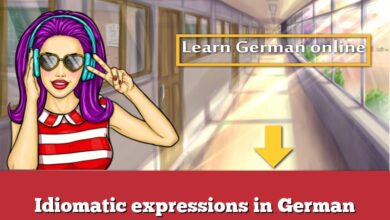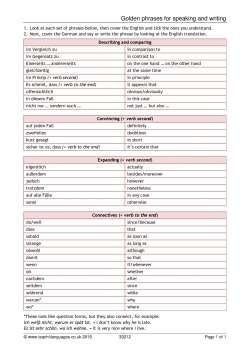

German Essay Phrases: 24 Useful Expressions to Write an Essay (For Goethe Exam or Real Life)
As we often think in English first, translating our ideas into useful German phrases can be tricky.
This handy blog post includes 24 essential German essay phrases to help make your writing flow more smoothly and sound more natural. Whether you’re preparing for the Goethe exam, a GCSE test, or just want to improve your written German for real-life situations, these chunks and phrases will help you. Easy German has a great video on useful German expression:
From organizing your thoughts with transitions like “ zudem ” and “ außerdem “, to expressing your opinion with phrases like “ meiner Meinung nach ” and “ ich denke, dass… “, this post has you covered.
Write an essay with German essay phrases: learn how to structure your story
Goethe tests love a clear and logical format. They follow the same structure throughout the different levels. The good news is, when you’re learning a language, you can use these German essay phrases with these structures even in your real-life dialogues. Then, gradually, you can shift your focus to a more natural-sounding speaking.
First, begin with an engaging introduction to get the reader’s attention. This intro paragraph should also include a short thesis statement that outlines the central argument you’ll be taking.
In the body of your essay, organize your thoughts into separate paragraphs. Use transitional phrases like “ außerdem ” (furthermore) and “ zudem ” (moreover) to connect your paragraphs and create a flow.
After that, summarize your main points and restate your thesis. But! Avoid introducing new information. Leave the reader with a compelling final thought or even a call to action that makes your central argument stronger.
If you’re not certain enough, check the following list and learn about the must-have go-to German essay phrases now!

1. Erstens – Firstly
This German essay phrase is used to introduce the first point in your essay.
Erstens werden wir die Hauptargumente diskutieren. [Firstly, we will discuss the main arguments.]
2. Zweitens – Secondly
Normally, this phrase is there for you when you want to introduce the second point in a structured manner.
Zweitens betrachten wir einige Gegenbeispiele. [Secondly, we will look at some counterexamples.]
3. Drittens – Thirdly
Used to signal the third point for clarity in your argument.
Drittens ziehen wir eine Schlussfolgerung. [Thirdly, we will draw a conclusion.]
4. Einleitend muss man sagen… – To begin with, one has to say…
Start your essay with this phrase to introduce your key points.
Einleitend muss man sagen, dass dieses Thema komplex ist. [To begin with, one has to say that this topic is complex.]
5. Man muss … in Betracht ziehen – One needs to take … into consideration
When you want to consider a specific aspect in your discussion.
Man muss den historischen Kontext in Betracht ziehen. [One needs to take the historical context into consideration.]
6. Ein wichtiger Aspekt von X ist … – An important aspect of X is …
To highlight an important part…
Ein wichtiger Aspekt von Nachhaltigkeit ist die Ressourcenschonung. [An important aspect of sustainability is resource conservation.]
7. Man muss erwähnen, dass… – One must mention that …
Used to emphasize a point that need acknowledgement.
Man muss erwähnen, dass es verschiedene Ansichten gibt. [One must mention that there are different viewpoints.]
8. Im Vergleich zu – In comparison to…
To compare different elements in your essay.
Im Vergleich zu konventionellen Autos sind Elektrofahrzeuge umweltfreundlicher. [In comparison to conventional cars, electric vehicles are more eco-friendly.]
9. Im Gegensatz zu – In contrast to…
When you want to present an alternative viewpoint or argument.
Im Gegensatz zu optimistischen Prognosen ist die Realität ernüchternd. [In contrast to optimistic forecasts, reality is sobering.]
10. Auf der einen Seite – On the one hand
To add a new perspective.
Auf der einen Seite gibt es finanzielle Vorteile. [On the one hand, there are financial benefits.]

11. Auf der anderen Seite – On the other hand
Present an alternative viewpoint.
Auf der anderen Seite bestehen ethische Bedenken. [On the other hand, ethical concerns exist.]
12. Gleichzeitig – At the same time
When you want to show a simultaneous relationship between ideas.
Gleichzeitig müssen wir Kompromisse eingehen. [At the same time, we must make compromises.]
13. Angeblich – Supposedly
If you want to add information that is claimed but not confirmed.
Angeblich wurde der Konflikt beigelegt. [Supposedly, the conflict was resolved.]
14. Vermutlich – Presumably
Used when discussing something that is presumed but not certain.
Vermutlich wird sich die Situation verbessern. [Presumably, the situation will improve.]
15. In der Tat – In fact
To add a fact or truth in your essay.
In der Tat sind die Herausforderungen groß. [In fact, the challenges are great.]
16. Tatsächlich – Indeed
Emphasize a point or a fact.
Tatsächlich haben wir Fortschritte gemacht. [Indeed, we have made progress.]
17. Im Allgemeinen – In general
When discussing something in a general context.
Im Allgemeinen ist das System reformbedürftig. [In general, the system needs reform.]
18. Möglicherweise – Possibly
Spice your essay with a possibility or potential scenario.
Möglicherweise finden wir einen Konsens. [Possibly, we will find a consensus.]
19. Eventuell – Possibly
To suggest a potential outcome or situation.
Eventuell müssen wir unsere Strategie überdenken. [Possibly, we need to rethink our strategy.]
20. In jedem Fall / Jedenfalls – In any case
Used to emphasize a point regardless of circumstances.
In jedem Fall müssen wir handeln. [In any case, we must take action.]
21. Das Wichtigste ist – The most important thing is
If you want to highlight the most important thing in your saying.
Das Wichtigste ist, dass wir zusammenarbeiten. [The most important thing is that we cooperate.]
22. Ohne Zweifel – Without a doubt
To introduce a statement that is unquestionably trues.
Ohne Zweifel ist Bildung der Schlüssel zum Erfolg. [Without a doubt, education is the key to success.]
23. Zweifellos – Doubtless
Just as the previous one, when you want say something that is, without a doubt, true.
Zweifellos gibt es noch viel zu tun. [Doubtless, there is still a lot to be done.]
24. Verständlicherweise – Understandably
If you want to add a thing that is understandable in the given context.
Verständlicherweise sind einige Menschen besorgt. [Understandably, some people are concerned.]
Practice the most important German essay phrases
Practice the German essay phrases now!
This is just part of the exercises. There’s many more waiting for you if you click the button below!
Learn the language and more German essay words and sentences with Conversation Based Chunking
Conversation Based Chunking represents a powerful approach to learning language skills. It’s especially useful for productive purposes like essay writing.
By learning phrases and expressions used in natural discourse, students internalize vocabulary and grammar in context rather than as isolated rules. This method helps you achieve fluency and helps you develop a ‘feel’ for a an authentic patterns.
Chunking common multi-word units accelerates progress by reducing cognitive load compared to consciously constructing each sentence from individual words. Sign up now to get access to your German Conversation Based Chunking Guide.
Lukas is the founder of Effortless Conversations and the creator of the Conversation Based Chunking™ method for learning languages. He's a linguist and wrote a popular book about learning languages through "chunks". He also co-founded the language education company Spring Languages, which creates online language courses and YouTube content.
Similar Posts

Vegetables in German: 100+ Gemüse Vocabulary for a Healthy Life
Are you a secret food blogger? Or just a curious enthusiast? Maybe planning a trip to a German-speaking country? No matter which one, knowing the…

Family in German: 30+ Phrases to Talk About Family in German
Imagine this scenario: You’ve just met someone new, and you want to introduce your family to them. But you don’t know the words in German…

17 Ways to Say Beautiful in German: Compliment People & Describe Things
I was hiking in the Swiss Alps when I came across a breathtaking view that left me speechless. The snow-capped peaks glistened in the sun,…

6 ways to say good night in German + useful goodnight phrases with audio
Welcoming the night in German is like wrapping yourself in a cozy blanket of words. Whether you’re an early bird tucking in as dusk falls…

Learn German with Music: Best German songs to help you learn the language
Looking for a fun and engaging way to learn German? Why not try to learn German with music? Listening to German songs to learn can…

German Slang Words: 64 German Expressions and Slang Phrases to Sound Like a Native (Audio)
Ever wondered how you can sound more like a native speaker in German? Well, German slang is your answer! Denisa from Spring German (a project…
Leave a Reply Cancel reply
Your email address will not be published. Required fields are marked *
Useful German Essay Words and Phrases

Essay writing in German is in itself already a difficult endeavor. Now writing an essay in a foreign language like German —that’s on a different plane of difficulty.
To make it easier for you, here in this article, we’ve compiled the most useful German essay phrases. Feel free to use these to add a dash of pizzazz into your essays. It will add just the right amount of flourish into your writing—enough to impress whoever comes across your work!
German essay words
These words are very useful to start writing essays in German in academic way.
Tips for writing an essay in German
Other lessons

speak with a doctor in German

Talk About Your Family in German

Seit vs Vor in German

German phrases about digital transformation

Phrases at the cinema in German
Learn about telling time in german.

Phrases of congratulation on mothers day in German

100 of the Best German Adjectives for Any Place & Time

German phrases at the bank

The Rainbow Fish in German

Names of insects in German

What do you know about German ordinal numbers ?

Simplifying the German Declension (Part I)

Industrial materials in German

Art Vocabulary in German

Quotation Marks in German

Song Guten Morgen Sonnenschein in German

German phrases at church

German Verbs and Conjugations

German phrases and expressions

tools of knowledge and indefinite in German

Tips to Learn German

German phrases at home

German phrases about Diet

Personal Pronouns: nominative case in German

German phrases about healthy food

Bird species in German

Passive Voice in German

“davon”, “darauf” and “damit” In German

Idiomatic expressions in German
Helpful German Expressions to Organize Your Writing
Using expressions to organize ideas
Todd Warnock/Moment/Getty Images
- History & Culture
- Pronunciation & Conversation
- M.A., German Studies, McGill University
- B.A., German and French
If you feel that your German writing assignments sound choppy or stilted, try incorporating some of the following expressions to make your writing flow better. These are all variations of common phrases that we often include in our native language — often without even thinking about it.
Listing and Ordering Facts and Ideas
- First of all, first — zunächst, erstens.
- Secondly, thirdly... — zweitens, drittens...
- besides — außerdem.
- then — dann.
- incidentally — übrigens.
- further — darüber hinaus.
- above all — vor allem.
- lastly, finally — letztendlich, schließlich.
Introducing and Stating Examples
- For example — zum Beispiel (abbreviated as z.B.)
- An example, as in "I would like to give an example" — ich möchte ein Beispiel anführen.
- Referring to point/example… — dabei sei auf Punkt/Beispiel… hingewiesen
- namely — und zwar.
To Clarify a Point
- In other words — Mit anderen Worten, anders ausgedrückt.
- This signifies particularly... — Dies gilt besonders für...
- This means — Dies bedeutet.
Writing a Summary or Conclusion
- In a nutshell — Im Großen und Ganzen.
- In a word — Kurz und gut.
- In conclusion — zum Schluss.
- To conclude, one can say that… — Zusammenfassend lässt sich sagen, dass...
- German Expressions
- Expressing an Opinion in German
- How to Use German Dative Prepositions
- How to Write a Letter in German: Format and Language
- German Phrasebook: In the Classroom
- The Quick Guide on Descriptive German Adjectives
- Die Bremer Stadtmusikanten - German Reading Lesson
- German Reading Lesson - Im Kaufhaus - Department Store
- How to Express Congratulations in German
- A Guide to German Toasts
- The Many Meanings of the German Verb 'Lassen'
- Learn the Colors, and Colorful Expressions, in German
- How to Use the Subjunctive Past in German
- Johann Wolfgang von Goethe Quotations
- Doch ...and Other Tricky German Words
- How To Express 'To Prefer' in German

Vocabulary lists
You want to be sure that you're learning only the words you need? You want to focus on vocabulary related to specific topics and areas? Then you should try out our word lists.
More than just a list of words and their translations: You can train the words directly with our vocabulary learning tool. Proof that you are able to understand and to use the words.
This section is new: Try the lists and trainer, give us feedback and help us improving your learning experience. We strive to provide accurate, helpful, effective and entertaining tools to expand your German vocabulary.
Why to learn German with us?
- free online resources to learn and practice the German language.
- online exercises and tables for all major grammar topics.
- online trainer for vocabulary , conjugation and to become used to the cases .
- all exercises and examples are written by German native speakers.

How to support German.net
- Recommend us to your friends on Facebook, Google+ & offline:
404 Not found
- Application process for Germany VISA
- Germany Travel Health Insurance
- Passport Requirements
- Visa Photo Requirements
- Germany Visa Fees
- Do I need a Visa for short stays in Germany?
- How to Get Flight Itinerary and Hotel Booking for Visa Application
- Germany Airport Transit Visa
- Germany Business VISA
- Guest Scientist VISA
- Germany Job Seeker Visa
- Medical Treatment VISA
- Tourist & Visitor Visa
- Trade Fair & Exhibitions VISA
- Training or Internship VISA
- Study Visa for Germany
- Working (Employment) VISA
- German Pronunciation
- German Volabulary
- Requirements
- Health Insurance
- Trend & Living
- Free Assessment Form
- Privacy Policy
Learn German Home Vocabulary: Essay Writing on Mein Haus

Learning a new language is always an exciting and rewarding experience. When it comes to German, having a strong vocabulary is essential for effective communication. In this article, we will explore some common German vocabulary words that are used to describe a house. We will also provide you with tips on how to write an essay on “ Mein Haus ” (My House) at different proficiency levels, from beginner to advanced. Whether you are just starting out with German or looking to expand your vocabulary and writing skills, this article will be a valuable resource for you.
In this article, we have provided a list of 50 German vocabulary words related to a house, including their English translations and pronunciation using the International Phonetic Alphabet (IPA). These words cover a range of features, from basic room types and furniture to outdoor structures and utilities. By learning these words, you will be able to describe your home or ask questions about someone else’s.
We have also included five essay titles that cater to different proficiency levels, from beginner to advanced. Whether you are just starting out with German or looking to challenge yourself with more complex sentences and vocabulary, there is an essay title for you. Each essay title comes with a minimum word count requirement, which will help you structure your writing and stay focused.
Table of Contents
50 german vocabulary words related to a house (mein haus), including their english translations and pronunciation using the international phonetic alphabet (ipa).
- Haus (house) [haʊs]
- Zimmer (room) [ˈtsɪmɐ]
- Wohnzimmer (living room) [ˈvoːnzɪmɐ]
- Schlafzimmer (bedroom) [ˈʃlaːfˌtsɪmɐ]
- Küche (kitchen) [ˈkʏçə]
- Badezimmer (bathroom) [ˈbaːdəˌtsɪmɐ]
- Garten (garden) [ˈɡaʁtn̩]
- Balkon (balcony) [ˈbalkɔn]
- Terrasse (terrace) [tɛˈrasə]
- Fenster (window) [ˈfɛnstɐ]
- Tür (door) [tyːɐ̯]
- Boden (floor) [ˈboːdn̩]
- Wand (wall) [vand]
- Dach (roof) [dax]
- Treppenhaus (staircase) [ˈtʁɛpənˌhaʊs]
- Treppe (stairs) [ˈtʁɛpə]
- Teppich (carpet) [ˈtɛpɪç]
- Sofa (sofa) [ˈzoːfa]
- Sessel (armchair) [ˈzɛsl̩]
- Bett (bed) [bɛt]
- Schrank (wardrobe) [ʃʁaŋk]
- Regal (bookshelf) [ʁeˈɡaːl]
- Tisch (table) [tɪʃ]
- Stuhl (chair) [ʃtuːl]
- Lampe (lamp) [ˈlampə]
- Steckdose (power outlet) [ˈʃtɛkdozə]
- Spiegel (mirror) [ˈʃpiːɡl̩]
- Waschmaschine (washing machine) [ˈvaʃmasçiːnə]
- Kühlschrank (refrigerator) [ˈkyːlʃraŋk]
- Herd (stove) [hɛrt]
- Ofen (oven) [ˈoːfən]
- Geschirrspüler (dishwasher) [ɡəˈʃɪʁʁʃplyːɐ̯]
- Heizung (heating) [ˈhaɪtsʊŋ]
- Kamin (fireplace) [kaˈmiːn]
- Dusche (shower) [ˈdʊʃə]
- Badewanne (bathtub) [ˈbaːdəˌvanə]
- Handtuch (towel) [ˈhantʊx]
- Decke (blanket) [ˈdɛkə]
- Kissen (pillow) [ˈkɪsn̩]
- Vorhang (curtain) [ˈfoːʁhaŋ]
- Gardine (curtain) [ɡaʁˈdiːnə]
- Rollladen (roller shutter) [ˈʁɔlaːdən]
- Jalousie (blind) [ʒaluˈziː]
- Sonnenschirm (sun umbrella) [ˈzɔnənʃiʁm]
- Rasen (lawn) [ˈʁaːzn̩]
- Zaun (fence) [zaʊn]
- Türklingel (doorbell) [ˈtyːɐ̯klɪŋl̩]
- Briefkasten (mailbox) [ˈbʁiːfkastn̩]
- Hausnummer (house number) [ˈhaʊsˌnʊmɐ]
- Garagen (garage) [ɡaˈʁaːʒən]
5 German Essays on My House: Meine Haus
Beginner level: mein haus.
Ich lebe in einem kleinen Haus in der Stadt. Es ist zweistöckig und hat einen kleinen Garten. Im Erdgeschoss gibt es ein Wohnzimmer, eine Küche und ein Badezimmer. Im ersten Stock gibt es zwei Schlafzimmer und ein weiteres Badezimmer. Mein Zimmer befindet sich im ersten Stock und ich mag es sehr. Es hat eine schöne Aussicht auf den Garten. Ich fühle mich hier sehr wohl.
I live in a small house in the city. It is two-story and has a small garden. On the ground floor, there is a living room, a kitchen, and a bathroom. On the first floor, there are two bedrooms and another bathroom. My room is on the first floor, and I like it very much. It has a beautiful view of the garden. I feel very comfortable here.
Elementary Level: Mein Haus
Essay Two:
Mein Traumhaus
Mein Traumhaus ist sehr groß und modern. Es hat drei Stockwerke und einen großen Garten mit einem Pool. Im Erdgeschoss gibt es eine geräumige Küche, ein großes Wohnzimmer und ein Esszimmer. Es gibt auch ein Arbeitszimmer und ein Badezimmer. Im ersten Stock gibt es vier Schlafzimmer und drei Badezimmer. Das Hauptschlafzimmer hat ein eigenes Badezimmer und einen begehbaren Kleiderschrank. Im zweiten Stock gibt es einen Fitnessraum und ein Spielzimmer. Es gibt auch eine Dachterrasse mit einem Whirlpool. Das ist mein Traumhaus.
My Dream House
My dream house is very big and modern. It has three floors and a large garden with a pool. On the ground floor, there is a spacious kitchen, a large living room, and a dining room. There is also a study and a bathroom. On the first floor, there are four bedrooms and three bathrooms. The master bedroom has its own bathroom and a walk-in closet. On the second floor, there is a gym and a game room. There is also a roof terrace with a hot tub. That is my dream house.
Intermediate Level: Mein Haus
Essay Three:
Mein Haus und meine Familie
Ich wohne mit meiner Familie in einem Haus am Stadtrand. Es hat vier Schlafzimmer, drei Badezimmer und ein großes Wohnzimmer. Wir haben auch einen Garten mit vielen Blumen und Bäumen. Im Sommer essen wir oft draußen auf der Terrasse. Meine Eltern haben ihr Schlafzimmer im ersten Stock und meine Geschwister und ich haben unsere Zimmer im zweiten Stock. Mein Zimmer ist groß und hat einen Balkon mit Blick auf den Garten. Ich verbringe viel Zeit in meinem Zimmer und lerne auch dort. Ich liebe mein Haus und meine Familie sehr.
My House and My Family
I live with my family in a house on the outskirts of the city. It has four bedrooms, three bathrooms, and a large living room. We also have a garden with many flowers and trees. In the summer, we often eat outside on the terrace. My parents have their bedroom on the first floor, and my siblings and I have our rooms on the second floor. My room is spacious and has a balcony with a view of the garden. I spend a lot of time in my room and also study there. I love my house and my family very much.
Advanced Level: Mein Haus
Essay Four:
Mein Haus und die Umgebung
Mein Haus befindet sich in einer ruhigen Gegend am Rande der Stadt. Es ist ein freistehendes Haus mit einem großen Garten. Wir haben eine Garage und einen Abstellraum für unsere Fahrräder und Werkzeuge. In der Umgebung gibt es viele Grünflächen und Spielplätze für Kinder. Es gibt auch eine Bushaltestelle in der Nähe, von der aus wir bequem in die Stadt fahren können. In der Umgebung gibt es auch viele Einkaufsmöglichkeiten und Restaurants. Wir haben Glück, dass wir in einer so schönen und praktischen Gegend wohnen.
My House and the Surroundings
My house is located in a quiet area on the outskirts of the city. It is a detached house with a large garden. We have a garage and a storage room for our bicycles and tools. In the surroundings, there are many green spaces and playgrounds for children. There is also a bus stop nearby from which we can easily travel to the city. In the area, there are also many shopping and dining options. We are lucky to live in such a beautiful and convenient area.
Essay Five:
Mein Traumhaus ist ein modernes Einfamilienhaus am See. Es hat große Fenster und eine Terrasse, die einen atemberaubenden Blick auf den See bietet. Das Haus ist in einem minimalistischen Stil gestaltet, mit klaren Linien und neutralen Farben.
Im Inneren gibt es eine offene Wohnküche mit einem großen Esstisch und modernen Geräten. Die Möbel sind bequem und stilvoll zugleich. Das Wohnzimmer verfügt über einen Kamin und eine gemütliche Couch, auf der ich mich entspannen und ein Buch lesen kann.
Das Haus hat auch ein Arbeitszimmer mit einem Schreibtisch und einem bequemen Stuhl, wo ich in Ruhe arbeiten kann. Das Schlafzimmer ist geräumig und hat ein großes Fenster, durch das ich den Sonnenaufgang über dem See sehen kann. Das Badezimmer ist modern und luxuriös, mit einer großen Badewanne und einer begehbaren Dusche.
Außerhalb des Hauses gibt es einen Garten mit einem Pool und einem Grillbereich, wo ich Freunde und Familie zu einem Barbecue einladen kann. Der See bietet viele Freizeitmöglichkeiten wie Angeln, Schwimmen und Bootfahren.
Mein Traumhaus ist der perfekte Ort, um zur Ruhe zu kommen und die Schönheit der Natur zu genießen.
My dream house is a modern single-family house by the lake. It has large windows and a terrace that offers a breathtaking view of the lake. The house is designed in a minimalist style, with clean lines and neutral colors.
Inside, there is an open-plan living kitchen with a large dining table and modern appliances. The furniture is comfortable and stylish at the same time. The living room has a fireplace and a cozy couch where I can relax and read a book.
The house also has a study with a desk and a comfortable chair where I can work in peace. The bedroom is spacious and has a large window through which I can see the sunrise over the lake. The bathroom is modern and luxurious, with a large bathtub and a walk-in shower.
Outside the house, there is a garden with a pool and a barbecue area where I can invite friends and family for a barbecue. The lake offers many recreational activities such as fishing, swimming, and boating.
My dream house is the perfect place to unwind and enjoy the beauty of nature.
In conclusion, learning German home vocabulary and writing an essay on “ Mein Haus ” is an effective way to improve your language skills. By expanding your vocabulary and practicing your writing, you will gain confidence in expressing yourself in German. We hope that this article has been a valuable resource for you and has inspired you to continue learning and exploring the German language.
More articles
Navigating the german language: a comprehensive starter vocabulary, 150+ common german phrases to sound like a native speaker, top german language books for self-learners: a comprehensive review, leave a reply cancel reply.
Save my name, email, and website in this browser for the next time I comment.
Difference between ein, eine, einen, and einem in the German Language
Some cheap and expensive things in germany, german essays on my family: meine familie, german universities where we can apply, without uni-assist, latest article, 56 tuition free master’s programs in computer science in germany – explore your options today, your gateway to germany: 20 universities where you can apply without uni-assist, expanding your software company in germany: a step-by-step guide, faqs: money transfer, jobs, and travel from india to germany.

Plan For Germany
© Plan for Germany. All rights reserved.
Sister Sites
Popular category.
- German Language 39
- Lifestyle 35
- Trend & Living 30
- Level A1 23
Editor Picks
Resources you can trust
GCSE German: Golden phrases for speaking and writing

A GCSE German handout with suggested phrases for students to include in their speaking and writing. It consists of a page of German opinion phrases and connectives plus their English translations.
By using these German essay phrases and spoken expressions, learners will be able to improve the variety and complexity of their language to access higher grades.
The list may also be useful for A-level German.
An extract from this list of useful German phrases:
All reviews
Have you used this resource?
Francesca Hedges
Resources you might like
You are using an outdated browser. Please upgrade your browser or activate Google Chrome Frame to improve your experience.
189 German Words That Learners Should Memorize ASAP [with Audio]
There are hundreds of thousands (potentially millions) of German words hanging around, just waiting to be learned and used.
But as a newcomer to German vocabulary, you’ll need to prioritize certain ones.
I’ll show you 189 of the most useful German words you should learn first.
I’ve chosen them based on frequency and usefulness. Learn these, and you’ll be much better off in your next German conversation.
Common German Nouns
German prepositions, german pronouns, common german phrases, german verbs, german adjectives, german body parts, german numbers, german time and seasons, common multi-purpose words and phrases, questions and responses, english imports, fun expressions, and one more thing....
Download: This blog post is available as a convenient and portable PDF that you can take anywhere. Click here to get a copy. (Download)
German nouns are gendered and paired with the appropriate pronoun: d er is the masculine pronoun, die is feminine, das is neuter and die is also used for plural nouns.
Let’s go over some of the critical ones you should know.
1. der Mann — man
2. die Frau — woman
3. das Kind — child
4. der Junge — boy
5. das Mädchen — girl
6. der Freund — friend
7. die Leute — people (plural)
8. die Familie — family
9. die Arbeit — work
10. die Stadt — city
11. das Ding — thing
12. das Beispiel — example
13. die Frage — question
14. das Problem — problem
15. das Leben — life
16. das Geld — money
17. das Essen — food
18. das Haus — house
German prepositions take different cases . Some can take on more than one, with a rule of thumb being that the dative is used for stasis or location and the accusative used for describing movement or a change of state.
Be aware that using the wrong case can imply a different meaning!
19. von — by, of, from (dative)
20. um — about, around, at (accusative)
21. zu — to, towards (dative)
22. bis — until, by, up to (accusative)
23. an — to, on (accusative or dative)
24. auf — on, to, upon (accusative or dative)
25. aus — from, out of (dative)
26. bei — by, at, near, in (dative)
27. seit — since, for (dative)
28. für — for (accusative)
29. vor — before, in front of (dative)
30. nach — after, towards (dative)
31. in — in (accusative or dative)
32. durch — through (accusative)
33. mit — with (dative)
34. neben — beside, near (dative)
German pronouns can be a little tricky for learners because they change depending on the case and, at times, gender. We’ll go over the pronouns in their nominative, accusative and dative forms (in that order).
35. ich / mich / mir — I / me
36. du / dich / dir — you (informal, singular)
37. er / ihn / ihm — he / him / it (for masculine nouns)
38. sie / sie / ihr — she / her / it (for feminine nouns)
39. es / es / ihm — it (for neuter nouns)
40. wir / uns / uns — we / us
41. ihr / euch / euch — you (informal, plural)
42. sie / sie / ihnen — they / them
43. Sie / Sie / Ihnen — you (formal, singular and plural)
Few conversations would feel complete without the bare essentials of phrases. These are the basic German phrases and expressions that you’re bound to use in any chat you have, no matter how long or short.
44. Hallo — Hello
45. Guten Morgen — Good morning
46. Guten Abend — Good afternoon
47. Gute Nacht — Good night
48. Ich heiße… — My name is…
49. Wie geht’s? — How are you? (informal)
50. Auf Wiedersehen — Goodbye / See you again
51. Tschüss — Bye
52. Gesundheit — Bless you
53. Ja — Yes
54. Nein — No
55. Vielleicht — Maybe / Perhaps
56. Bitte — Please / You’re welcome
57. Entschuldigung — Excuse me
58. Danke — Thanks
59. Es tut mir leid — I’m sorry
60. Genau — Exactly / That’s right
61. Ach so — I see
To get to know more everyday phrases in German, you can watch the videos on FluentU.
FluentU takes authentic videos—like music videos, movie trailers, news and inspiring talks—and turns them into personalized language learning lessons.
You can try FluentU for free for 2 weeks. Check out the website or download the iOS app or Android app.
P.S. Click here to take advantage of our current sale! (Expires at the end of this month.)

Try FluentU for FREE!
Off to do something? Hopefully you know how to say so in German. Here are some common German verbs that will get you going.
62. sein — to be
63. haben — to have
64. machen — to make, do
65. gehen — to go
66. nehmen — to take
67. bringen — to bring
68. werden — to become
69. wollen — to want
70. wissen — to know (information)
71. kennen — to know (a person or place)
72. können — can, to be able to
73. mögen — to like
74. denken — to think
Luckily, many adjectives in German sound quite similar to their English counterparts. Just don’t forget that in German, adjectives are also conjugated when paired with nouns.
75. gut — good
76. schlecht — bad
77. klein — small
78. groß — big, tall
79. schön — handsome, beautiful, lovely, nice
80. fantastisch — fantastic
81. traurig — sad
82. müde — tired
83. neu — new
84. alt — old
85. jung — young
86. kalt — cold
87. heiß — hot
88. kurz — short
89. lang — long
90. viel — a lot / very
91. wenig — a little
Knowing how to describe the body parts in German is essential for beginner learners. Here are some of the crucial body parts you should know right away.
92. der Körper — body
93. der Kopf — head
94. das Gesicht — face
95. die Augen — eyes
96. die Nase — nose
97. der Mund — mouth
98. der Hals — neck
99. die Schulter — shoulder
100. die Brust — chest / breast
101. der Rücken — back
102. der Bauch — stomach
103. der Arm — arm
104. die Hand — hand
105. das Bein — leg
106. der Fuß — foot
Counting in German is pretty simple, but you’ll of course have to get familiar with the numbers first. No worries—they should be pretty quick to memorize!
107. null — zero
108. eins — one
109. zwei — two
110. drei — three
111. vier — four
112. fünf — five
113. sechs — six
114. sieben — seven
115. acht — eight
116. neun — nine
117. zehn — ten
118. elf — eleven
119. zwölf — twelve
120. dreizehn — thirteen
121. vierzehn — fourteen
122. fünfzehn — fifteen
123. sechzehn — sixteen
124. siebzehn — seventeen
125. achtzehn — eighteen
126. neunzehn — nineteen
127. zwanzig — twenty
128. dreißig — thirty
129. vierzig — forty
130. fünfzig — fifty
131. sechzig — sixty
132. siebzig — seventy
133. achtzig — eighty
134. neunzig — ninety
135. hundert — one hundred
136. tausend — one thousand
Words associated with time in German and the time of year are also one of the first things on the beginner learner’s agenda. So make sure to start learning these!
137. die Zeit — time
138. früh — early
139. spät — late
140. die Uhr — clock / o’clock (pronoun removed)
141. die Stunde — hour
142. die Minute — minute
143. der Tag — day
144. die Woche — week
145. der Monat — month
146. das Jahr — year
147. der Winter — winter
148. der Frühling — spring
149. der Herbst — fall
150. der Sommer — summer
The words in this section are multi-purpose words that you’ll hear often, with definitions broad enough to apply in a variety of contexts—it’s handy to have these guys around.
151. Stimmt — agreed / right / true
It is often used to affirm a comment someone else has made.
152. Stimmt das? — Is that right?
153 . Das stimmt nicht — That’s not right
154. Stimmt so! — Keep the change (handy in restaurants/cafes if you’re feeling generous)
155. Genau — exactly
It serves as something of a filler or sentence connector when you’ve paused between statements, similar to the way you use “so” in English.
156. Genau hier — Right here
157. Genau wie — Exactly like
158. Also — well/so
159. Also! Fangen wir an? — Well, shall we get started? (Expression of enthusiasm)
160. Also…ich weiß es nicht — Well…I don’t know. (Expression of uncertainty)
161 . Äh — the German version of “um”
162. Oder — or / right / isn’t it?
163 . Einen schönen Abend / Tag noch — a lovely evening/day still
This phrase is used for polite leave-taking, usually between strangers or acquaintances. It is basically the equivalent of “have a nice day.”
164. Schönes Wochenende — have a nice weekend
165. Gleichfalls! — likewise / same to you
You can say this in reply to a polite leave-taking phrase such as the above. It’s the appropriate catch-all response to all manner of well wishing.
166. Wie, bitte? — pardon?
The polite way of asking someone to repeat themselves, if you haven’t heard or understood.
167 . Was geht? — what’s up? / what’s going on?
This is how you’d informally say “what’s up?” or “what’s going on?” to a friend.
168. Was ist los? — What’s wrong?
169. Hast du was (etwas)? — Is something wrong?
170. Warum? — Why?
171. Echt? — Really?
172. Geil! — Cool!
173. Ach, so! — Aha!
It’s also a good idea to brush up on your Umgangsprache (slang) here .
It’s reassuring to know that you’re going to regularly come across many German words that you recognize. A growing number of German words are direct imports from English.
Take these verbs:
174. skypen — Skype
175. downloaden — to download
176. checken — to check
177. chatten — to chat
178. bloggen — to blog
These have all been effectively adapted from English to the German grammatical structure. As you can see, many come from relatively recent developments in digital technology. But you’ll also find:
179. surfen — to surf (on the net as well as at the beach)
180. joggen — to jog
181. pushen — to push
182 . flirten — to flirt
183. babysitten — to babysit
184. smalltalken — to small talk
And, increasingly:
185. sorry — sorry (is it really surprising when Entschuldigung is such a mouthful?)
Finally, here’s a fairly exhaustive list of English loanwords in German .
You’ll need to have a giggle from time to time. Lucky for you, German has plenty of amusing yet functional words to offer. Here’s a few that might make you smile.
186. Quatsch — rubbish
For example:
Das ist Quatsch (that’s rubbish) or quatschen (to talk rubbish)
187. Blöd — stupid
188. Lust — passion or inclination
If someone asks you if you have Lust auf Schockolade , they’re not prompting you to expose your burning desire for the stuff, but rather whether you feel like eating it.
Similarly, ich habe keine Lust darauf simply means “I don’t feel like it.”
189. Jein — yes and no
It’s used to express a divided opinion.
189 words sounds like a lot, but remember, these are just the tip of the German language iceberg! Our complete guide on how to learn German vocabulary is here .
Once you’re confident with the essentials, you can plow forward and indulge in all the other fun and quirky words unique to German!
Want to know the key to learning German effectively?
It's using the right content and tools, like FluentU has to offer ! Browse hundreds of videos, take endless quizzes and master the German language faster than you've ever imagine!

Watching a fun video, but having trouble understanding it? FluentU brings native videos within reach with interactive subtitles.

You can tap on any word to look it up instantly. Every definition has examples that have been written to help you understand how the word is used. If you see an interesting word you don't know, you can add it to a vocabulary list.

And FluentU isn't just for watching videos. It's a complete platform for learning. It's designed to effectively teach you all the vocabulary from any video. Swipe left or right to see more examples of the word you're on.

The best part is that FluentU keeps track of the vocabulary that you're learning, and gives you extra practice with difficult words. It'll even remind you when it’s time to review what you’ve learned.
Start using the FluentU website on your computer or tablet or, better yet, download the FluentU app from the iTunes or Google Play store. Click here to take advantage of our current sale! (Expires at the end of this month.)
Enter your e-mail address to get your free PDF!
We hate SPAM and promise to keep your email address safe

- Free Resources
- 1-800-567-9619
- Subscribe to the blog Thank you! Please check your inbox for your confirmation email. You must click the link in the email to verify your request.
- Explore Archive
- Explore Language & Culture Blogs
The Environment: German Vocab & Reading Posted by Constanze on Apr 29, 2019 in Culture , Language
Guten Tag! Today we’re going to talk about die Umwelt (the environment). Each year on April 22nd, the world celebrates der Tag der Erde (Earth Day). This is a day where events are held and awareness is raised about protecting unser Planet (our planet) and the environment. This post will provide you with plenty of vocabulary on the environment, and related posts from this blog about Germany and the environment.

all images: pixabay
Earth Day – der Tag der Erde
Earth – die Erde
environment – die Umwelt
environmentally-friendly – umweltfreundlich
pollution – die Umweltverschmutzung (sometimes shortened to die Verschmutzung )
climate change – der Klimawandel
global warming – die globale Erwärmung
greenhouse effect – der Treibhauseffekt
renewable energy – die erneuerbare Energie
solar panel – der Sonnenkollektor (‘sun collector’!)
recycling – das Recycling / die Wiederverwertung
to recycle – recyceln / wieder verwerten
to reduce – reduzieren
to reuse – wieder verwenden
waste – der Abfall / der Müll
to waste – verschwenden
zero waste – null-Abfall / null-Müll
extreme weather – das extremes Wetter (also called ‘das Unwetter’ )
eco-system – das Ökosystem
deforestation – die Abholzung
over-fishing – die Überfischung
agriculture – die Landwirtschaft
meat consumption – der Fleischkonsum
plastic – das Plastik / der Kunststoff
straw – der Strohhalm
plastic bag – die Plastiktüte
paper bag – die Papiertüte
sea – das Meer
ocean – der Ozean
lake – der See
forest – der Wald
volcano – der Vulkan
iceberg — der Eisberg
fresh air – die frische Luft

Here is a selection of posts on this blog that talk about environmental topics in Germany:
Rettet die Bienen! This post discusses attempts in Germany to save the bees.
Diesel-Fahrverbot The first section of this post talks about the banning of diesel cars in Germany.
Der Blaue Engel This post talks about a German stamp that signifies a product is environmentally friendly.
Mülltrennung This post talks about how waste gets separated in Germany.
Bottle deposits (Pfand) The second part of this post talks about the bottle deposit (Pfand) system in Germany.
Heißzeit This post talks about the 2018 German ‘Word Of The Year’, which references the extremely hot weather Germany had that year.

Build vocabulary, practice pronunciation, and more with Transparent Language Online. Available anytime, anywhere, on any device.

About the Author: Constanze
Servus! I'm Constanze and I live in the UK. I'm half English and half German, and have been writing about German language and culture on this blog since 2014. I am also a fitness instructor & personal trainer.
Gerhild West:
This information about the earth is just great for my advanced group. Thank you very much
Newton Peart:
I loved in Berlin many years ago am now living in Jamaica very difficult to find German speakers,these blogs help keep up to date.
Mit freundlichen grüssen
- Skip to primary navigation
- Skip to main content
- Skip to primary sidebar
- Skip to footer
StoryLearning
Learn A Language Through Stories
92 Basic German Phrases To Survive Your First Conversation With A Native
Have you ever wanted to learn German?
Or are you planning a trip to a German-speaking country?
To get started and have your first basic conversations in German, you're going to need to learn some words!
In this post, you'll learn 92 basic German phrases and words that will help you on your travels or just at home.
To make it easier for you, I've divided the phrases into different categories.
German Greetings & Introductions
- “I do not understand!” – Getting Out Of Sticky Situations
Numbers In German
Visiting a german restaurant, transport – getting around in germany.
- Asking For Directions
- Shopping In German
- Dealing with Medical Emergencies
- Finding Hidden Gems
Whether you're going to Germany or Austria or Switzerland, chances are you can get by in English. But if you learn basic German too, you'll be able to connect more with German speakers.
Having a few common German phrases will make you experience these countries in a completely different way.
And even at home , learning German will allow you to learn more about German culture and connect with native German speakers in your local community.
You don't need to have a natural flair for language learning. Learning a few key phrases and being able to use them is a great start. And German isn't as hard as its reputation suggests, especially for native English speakers.
You never know, maybe learning these phrases will motivate you to go on and learn to speak German fluently.
Note: Want to go beyond basic German phrases and learn German with confidence and fluency? The best way to do so is by working through a comprehensive and well designed course.
My top recommendation is German Uncovered , my in-depth online German course for beginners that teaches you through the power of story. If you’re ready to get started, click here for a 7-day FREE trial.
If you want to make a good impression with German speakers, you'll need a few basic phrases to meet and greet people.
After all, you're going to use greetings every time you have a conversation in German!
These phrases are simple, easy to remember and will help you make new German friends.
#1 Hallo – Hello [any time of day]
#2 Hallo, wie geht’s? – Hello, how are you?
#3 Guten Morgen – Good morning
#4 Guten Tag [lit. good day] – Good afternoon
#5 Guten Abend – Good evening
#6 Gute Nacht – Good night
#7 Vielen Dank – Thank you very much
#8 Ich danke Ihnen auch – Thank you, too [in reply to “thank you” from someone else else]
#9 Tschüss, bis zum nächsten Mal – Goodbye, see you next time
#10 Schönes Wetter heute, nicht wahr? – It's lovely weather today, is not it?
#11 Mein Name ist _ – My name is _____
#12 Ich bin Amerikaner, Kanadier, Engländer (male) – I'm American / Canadian / English
#13 Ich bin Amerikanerin, Kanadierin, Engländerin (female) – I'm American / Canadian / English
#14 Woher kommen Sie? – Where are you from?
#15 Freut mich – Nice to meet you!
⬑ Jump back to the contents
“I Do Not Understand!” – Getting Out Of Sticky Situations
It might seem a little intimidating to speak German, especially if you're new to the language. German people will be understanding if you're struggling to get your message across or catch what they say .
At the same time, don't hesitate to use these expressions to help the conversation run smoothly if you don't understand something or need a little help.
#16 Es tut mir leid, aber ich verstehe nicht – I'm sorry, but I do not understand
#17 Ich spreche nicht gut Deutsch – I do not speak German very well
#18 Können Sie das bitte wiederholen? – Could you say that again please?
#19 Können Sie bitte langsamer sprechen? – Could you say that more slowly please?
#20 Schreiben Sie das bitte für mich auf – Please write that down for me
#21 Was bedeutet das? – What does that mean?
#22 Sprechen Sie Englisch? – Do you speak English?
#23 Es tut mir leid – I'm sorry
#24 Ich weiß nicht – I do not know
#25 In Ordnung – All right
#26 Macht nichts – never mind
Whether you're at the supermarket, ordering in a restaurant, or just having a normal conversation, it's essential to know how to use numbers in German. Eins, zwei, drei….l et's get to it!
- null – zero
- eins – one
- zwei – two
- drei – three
- vier – four
- fünf – five
- sechs – six
- sieben – seven
- acht – eight
- neun – nine
- zehn – ten
- elf – eleven
- zwölf – twelve
- dreizehn – thirteen
- vierzehn – fourteen
- fünfzehn – fifteen
- sechzehn – sixteen
- siebzehn – seventeen
- achtzehn – eighteen
- neunzehn – nineteen
- zwanzig – twenty
- einundzwanzig – twenty-one
- zweiundzwanzig – twenty-two
- dreiundzwanzig – twenty-three
- vierundzwanzig – twenty-four
- fünfundzwanzig – twenty-five
- sechsundzwanzig – twenty-six
- siebenundzwanzig – twenty-seven
- achtundzwanzig – twenty-eight
- neunundzwanzig – twenty-nine
- dreißig – thirty
- einunddreißig – thirty-one
- zweiunddreißig – thirty-two
- vierzig – forty
- fünfzig – fifty
- sechzig – sixty
- siebzig – seventy
- achtzig – eighty
- neunzig – ninety
- hundert – one hundred
- zweihundertfünfzig – two hundred and fifty
- fünfhundert – five hundred
- siebenhundertdreiundachtzig – seven hundred and eighty three
- tausend – one thousand
One of the most enjoyable cultural experiences you can have in a German-speaking country is visiting a restaurant and trying out some of the delicious local dishes.
The following phrases cover all the questions and statements you need to make when eating out, from asking for a table to paying the bill!
#27 Ein Tisch für eine Person bitte – A table for one, please
#28 Ein Tisch für zwei Personen, bitte – A table for two, please
#29 Haben Sie schon auf? – Are you open yet?
#30 Können wir (auf einen Tisch) warten? – Can we wait (for a table)?
#31 Können wir dort sitzen? – Can we sit over there?
#32 Entschuldigung! – Excuse me! [Calling a waiter]
#33 Was empfehlen Sie? – What do you recommend?
#34 Was ist das beliebteste Gericht? – What's your most popular dish?
#35 Was ist das? – What is this?
#36 Was für Bier haben Sie? – What type of beer do you have?
#37 Ein kleines Bier bitte – A small beer, please
#38 Ein großes Bier bitte – A large beer, please
#39 Bringen Sie mir bitte eine Auswahl von leckeren Sachen – Please bring me a selection of nice things
#40 Bitte wählen Sie etwas – It's up to you / You can decide
#41 Die Rechnung, bitte – The bill, please
#42 Kann ich bitte die Speisekarte haben? – Can I have the menu, please?
By the way, if you're interested in food and drink as it relates to German culture, take a look at this post about Oktoberfest, the world-famous Bavarian beer festival.
There are lots of practicalities to consider when taking a trip to Germany, including finding your way around. Finding the right train or bus on time isn’t always easy and you don’t want to end up being the ‘foreigner’ who is holding up the ticket queue!
In this section, you’ll learn some key transport phrases that will help you quickly and easily navigate your way around any German-speaking city or country.
#43 Ich möchte nach _____ – I want to go to
#44 Wann fährt der nächste Zug / Bus nach _____? – What time is the next train/bus to __ ?
#45 Was kostet das? – How much is it?
#46 Einmal/ zweimal (nach _____), bitte – 1 ticket / 2 tickets (to _____), please
#47 Wie lange dauert das? – How long does it take?
#48 Wohin muss ich jetzt gehen? – Where should I go now?
#49 Wann fährt er ab? – When does it leave?
#50 Wie spät ist es (jetzt)? – What time is it (now)?
#51 Hält der Zug/ Bus in _ ? – Does this train/bus stop in _____?
#52 Entschuldigen Sie, ist dies _____? – Excuse me, is this _____ ? [Useful when you're on the bus / train and are not sure when to get off]
#53 Können Sie das bitte für mich aufschreiben? – Can you write that down for me?
#54 Zeigen Sie mir das bitte auf der Karte? – Can you show me on the map?
#55 Wo ist _____ auf der Karte? – Where is _____ on the map?
Asking For Directions In German
Public transport in Germany is notoriously excellent, but there are some places you'll need to walk or drive to yourself. And for most of us, that means occasionally getting lost and asking for directions!
Here are the phrases you need to ask and receive directions in German:
#56 Entschuldigung, darf ich Sie etwas fragen? – Excuse me, could I ask you something?
#57 Ich möchte nach _____ – I want to go to _ [If you know the name of your destination]
#58 Ich möchte dahin – I want to go here [Pointing to your destination on the map]
#59 Ich habe mich verlaufen – I'm lost (on foot)
#60 Ich habe mich verfahren – I'm lost (by car)
#61 Wie komme ich dahin? – How can I get there?
#62 Geht es hier lang? – Is it this way? [Useful for checking if you're walking in the right direction]
#63 Zeigen Sie mir das bitte auf der Karte? – Can you show me on the map?
#64 Wo ist __? – Where is _ ?
Shopping And Grabbing A Bargain In German
Whether you're at the supermarket, the shopping centre or the local farmer's market you're going to buy things at some point or another!
And even haggle a bit – just like you would in English. Grab a bargain in German with these sentences.
#65 Das gefällt mir – I like this
#66 Was kostet das? – How much is this?
#67 Bitte wiederholen Sie das – Can you say that again please?
#68 Schreiben Sie das bitte für mich auf? – Can you write that down for me?
#69 Und wenn ich das alles kaufe? – If I buy these together? [A useful way to knock the price down]
#70 Das ist mir zu teuer – it's too expensive for me
#71 Geben Sie mir einen Rabatt? – Can you give me a discount?
#72 Ich suche nach _____ – I'm looking for a _____
#73 Ich schaue mich nur um – I'm just looking around
#74 Danke, ich suche noch weiter – Thank you, I'll keep looking [if you're getting hassled to buy something]
#75 Moment, bitte – Just a moment
#76 Ja, bitte – Yes, please
#77 Nein, danke – No, thanks
Dealing With Medical Emergencies In German
Hopefully, you'll never need the phrases in this section! Nonetheless, it's always good to know some basic medical vocabulary so that you can handle an emergency if you're unwell or have an accident.
#78 Können Sie mir bitte helfen? – Can you help me, please?
#79 Ich brauche einen Arzt – I need to see a doctor
#80 Es geht mir nicht gut – I do not feel well
#81 Es geht ihm/ihr nicht gut – he / she does not feel well
#82 Gibt es ein Krankenhaus in der Nähe? – Is there a hospital near here?
#83 Fahren Sie mich bitte zum Krankenhaus – Take me to the hospital [To a taxi driver]
#84 Es tut hier weh – It hurts here [pointing to body part]
#85 Ich brauche Medizin – I need some medicine
Finding Hidden Gems In German-Speaking Countries
I've included a couple of questions you can ask the locals, so you can find the hidden gems in their cities and have a more authentic German experience!
#86 Es tut mir leid, Sie zu stören, aber… – I'm sorry to bother you, but …
#87 Kann ich Sie schnell etwas fragen? – Could I ask you something quickly?
#88 Ich suche ein Restaurant mit gutem Essen hier in der Nähe – I'm looking for a place with good food around here
#89 Ich suche ein nettes Café in der Nähe – I'm looking for a nice cafe in the area
#90 Wissen Sie etwas über _____? – Do you know anything about _____ ?
#91 Gibt es hier in der Nähe etwas Interessantes zu sehen? – Is there anything interesting to see in this area?
#92 Trotzdem danke – Thank you anyway [if the person can not help you]
Your Next Steps In German
So there you have it: a collection of German expressions to help you get started on your new adventure!
With these phrases in your back pocket, you'll soon find yourself having your first basic conversations and getting excited about continuing to improve your German .
So now that you've learned the basics, are you ready to take the next step in your German adventure?
I'm a big believer in the power of story to enable you to learn a language . That's why I've created an entire beginner course to help you learn German online by immersing yourself in a compelling story.
It's my German Uncovered course, and it's designed to take you from beginner to B1 Intermediate level.
Click here for more information on the course and how it'll help you.
Language Courses
- Language Blog
- Testimonials
- Meet Our Team
- Media & Press
Download this article as a FREE PDF ?
What is your current level in Swedish?
Perfect! You’ve now got access to my most effective [level] Swedish tips…
Where shall I send the tips and your PDF?
We will protect your data in accordance with our data policy.
What is your current level in Danish?
Perfect! You’ve now got access to my most effective [level] Danish tips…
NOT INTERESTED?
What can we do better? If I could make something to help you right now, w hat would it be?
Which language are you learning?
What is your current level in [language] ?
Perfect! You’ve now got access to my most effective [level] [language] tips, PLUS your free StoryLearning Kit…
Where shall I send them?
Download this article as a FREE PDF?
Great! Where shall I send my best online teaching tips and your PDF?
Download this article as a FREE PDF ?
What is your current level in Arabic?
Perfect! You’ve now got access to my most effective [level] Arabic tips…
FREE StoryLearning Kit!
Join my email newsletter and get FREE access to your StoryLearning Kit — discover how to learn languages through the power of story!
Download a FREE Story in Japanese!
Enter your email address below to get a FREE short story in Japanese and start learning Japanese quickly and naturally with my StoryLearning® method!
What is your current level in Japanese?
Perfect! You’ve now got access to the Japanese StoryLearning® Pack …
Where shall I send your download link?
Download Your FREE Natural Japanese Grammar Pack
Enter your email address below to get free access to my Natural Japanese Grammar Pack and learn to internalise Japanese grammar quickly and naturally through stories.
Perfect! You’ve now got access to the Natural Japanese Grammar Pack …
What is your current level in Portuguese?
Perfect! You’ve now got access to the Natural Portuguese Grammar Pack …
What is your current level in German?
Perfect! You’ve now got access to the Natural German Grammar Pack …
Train as an Online Language Teacher and Earn from Home
The next cohort of my Certificate of Online Language Teaching will open soon. Join the waiting list, and we’ll notify you as soon as enrolment is open!
Perfect! You’ve now got access to my most effective [level] Portuguese tips…
What is your current level in Turkish?
Perfect! You’ve now got access to my most effective [level] Turkish tips…
What is your current level in French?
Perfect! You’ve now got access to the French Vocab Power Pack …
What is your current level in Italian?
Perfect! You’ve now got access to the Italian Vocab Power Pack …
Perfect! You’ve now got access to the German Vocab Power Pack …
Perfect! You’ve now got access to the Japanese Vocab Power Pack …
Download Your FREE Japanese Vocab Power Pack
Enter your email address below to get free access to my Japanese Vocab Power Pack and learn essential Japanese words and phrases quickly and naturally. (ALL levels!)
Download Your FREE German Vocab Power Pack

Enter your email address below to get free access to my German Vocab Power Pack and learn essential German words and phrases quickly and naturally. (ALL levels!)
Download Your FREE Italian Vocab Power Pack
Enter your email address below to get free access to my Italian Vocab Power Pack and learn essential Italian words and phrases quickly and naturally. (ALL levels!)
Download Your FREE French Vocab Power Pack
Enter your email address below to get free access to my French Vocab Power Pack and learn essential French words and phrases quickly and naturally. (ALL levels!)
Perfect! You’ve now got access to the Portuguese StoryLearning® Pack …
What is your current level in Russian?
Perfect! You’ve now got access to the Natural Russian Grammar Pack …
Perfect! You’ve now got access to the Russian StoryLearning® Pack …
Perfect! You’ve now got access to the Italian StoryLearning® Pack …
Perfect! You’ve now got access to the Natural Italian Grammar Pack …
Perfect! You’ve now got access to the French StoryLearning® Pack …
Perfect! You’ve now got access to the Natural French Grammar Pack …
What is your current level in Spanish?
Perfect! You’ve now got access to the Spanish Vocab Power Pack …
Perfect! You’ve now got access to the Natural Spanish Grammar Pack …
Perfect! You’ve now got access to the Spanish StoryLearning® Pack …
Where shall I send them?
What is your current level in Korean?
Perfect! You’ve now got access to my most effective [level] Korean tips…
Perfect! You’ve now got access to my most effective [level] Russian tips…
Perfect! You’ve now got access to my most effective [level] Japanese tips…
What is your current level in Chinese?
Perfect! You’ve now got access to my most effective [level] Chinese tips…
Perfect! You’ve now got access to my most effective [level] Spanish tips…
Perfect! You’ve now got access to my most effective [level] Italian tips…
Perfect! You’ve now got access to my most effective [level] French tips…
Perfect! You’ve now got access to my most effective [level] German tips…
Download Your FREE Natural Portuguese Grammar Pack
Enter your email address below to get free access to my Natural Portuguese Grammar Pack and learn to internalise Portuguese grammar quickly and naturally through stories.
Download Your FREE Natural Russian Grammar Pack
Enter your email address below to get free access to my Natural Russian Grammar Pack and learn to internalise Russian grammar quickly and naturally through stories.
Download Your FREE Natural German Grammar Pack
Enter your email address below to get free access to my Natural German Grammar Pack and learn to internalise German grammar quickly and naturally through stories.
Download Your FREE Natural French Grammar Pack
Enter your email address below to get free access to my Natural French Grammar Pack and learn to internalise French grammar quickly and naturally through stories.
Download Your FREE Natural Italian Grammar Pack
Enter your email address below to get free access to my Natural Italian Grammar Pack and learn to internalise Italian grammar quickly and naturally through stories.
Download a FREE Story in Portuguese!

Enter your email address below to get a FREE short story in Brazilian Portuguese and start learning Portuguese quickly and naturally with my StoryLearning® method!
Download a FREE Story in Russian!
Enter your email address below to get a FREE short story in Russian and start learning Russian quickly and naturally with my StoryLearning® method!
Download a FREE Story in German!
Enter your email address below to get a FREE short story in German and start learning German quickly and naturally with my StoryLearning® method!
Perfect! You’ve now got access to the German StoryLearning® Pack …
Download a FREE Story in Italian!
Enter your email address below to get a FREE short story in Italian and start learning Italian quickly and naturally with my StoryLearning® method!
Download a FREE Story in French!

Enter your email address below to get a FREE short story in French and start learning French quickly and naturally with my StoryLearning® method!
Download a FREE Story in Spanish!
Enter your email address below to get a FREE short story in Spanish and start learning Spanish quickly and naturally with my StoryLearning® method!
FREE Download:
The rules of language learning.

Enter your email address below to get free access to my Rules of Language Learning and discover 25 “rules” to learn a new language quickly and naturally through stories.
What can we do better ? If I could make something to help you right now, w hat would it be?
What is your current level in [language]?
Perfect! You’ve now got access to my most effective [level] [language] tips…
Download Your FREE Spanish Vocab Power Pack

Enter your email address below to get free access to my Spanish Vocab Power Pack and learn essential Spanish words and phrases quickly and naturally. (ALL levels!)
Download Your FREE Natural Spanish Grammar Pack
Enter your email address below to get free access to my Natural Spanish Grammar Pack and learn to internalise Spanish grammar quickly and naturally through stories.
Free Step-By-Step Guide:
How to generate a full-time income from home with your English… even with ZERO previous teaching experience.
What is your current level in Thai?
Perfect! You’ve now got access to my most effective [level] Thai tips…
What is your current level in Cantonese?
Perfect! You’ve now got access to my most effective [level] Cantonese tips…
Steal My Method?
I’ve written some simple emails explaining the techniques I’ve used to learn 8 languages…
I want to be skipped!
I’m the lead capture, man!
Join 84,574 other language learners getting StoryLearning tips by email…
“After I started to use your ideas, I learn better, for longer, with more passion. Thanks for the life-change!” – Dallas Nesbit
Perfect! You’ve now got access to my most effective [level] [language] tips…
Perfect! You’ve now got access to my most effective [level] [language] tips…
Join 122,238 other language learners getting StoryLearning tips by email…
Find the perfect language course for you.
Looking for world-class training material to help you make a breakthrough in your language learning?
Click ‘start now’ and complete this short survey to find the perfect course for you!
Do you like the idea of learning through story?
Do you want…?

How to Express Your Daily Routine in German
by fredo21
January 27, 2021
0 Comments
When you get up in the morning, what’s the first thing you do? Have coffee, brush your teeth, turn your computer on? Can you say it in German?
This article will explain the most-used German verbs for talking about your daily routine. You use them to tell someone how your day was or explain to your spouse why you were late from work. What is more, our German vocabulary for daily routine carries important grammar lessons that can improve your language skills.

Divisible Verbs
Our first choices are both divisible verbs, which play a key role in describing the beginning of your day.
Examples
Both verbs express a transition from one state to another (ex. from asleep to awake, from lying to standing), which is why they both take the auxiliary verb sein in the past tense:
Reflexive Verbs
Our list goes on with reflexive verbs. These verbs act on the subject itself. They always have sich in the infinitive form. Sich rasieren (to shave oneself) is another common daily routine verb that’s reflexive. In English, we wouldn’t say, “Shave yourself!” to someone, only “shave!” but in German, it would be “Rasiere dich!”
LEARN GERMAN WORDS AND EXPRESSIONS NOW!

SIGN UP NOW TO GET THESE FOR FREE!
- 100 Days of German Words and Expressions E-book
- 300 Useful German Adjectives
Let’s go back to “sich die Zähne putzen” for a second because it’s slightly different.
While the infinitive also has sich , the reflexive verb takes the dative in the first and second person singular. These are the only exceptions.
When there is a direct object, the verb takes the dative in the first and second person singular. When there isn’t, it takes the accusative.
In addition, waschen takes the umlaut in the second and third person singular:
This verb is extra-hard because it is both divisible and reflexive. Other than that, it’s just like our previous example.
Same rule: when there is a direct object, the verb takes the dative in the first and second person singular. When there isn’t, it takes the accusative. It doesn’t matter what clothing item or accessory you use.
Quite a few reflexive verbs offer much needed convenience, for example fernsehen – to watch TV. You don’t need to use the word for television because the verb expresses the entire action of watching television.Enter your text here...
In keeping with the rule, the verb sehen (to see) takes second position. The most common prefixes in divisible verbs are: an-, auf-, mit-, vor–, zu-, aus–, ab-, and ein-.
Another example is frühstücken (frue-shtuek-en) - to have breakfast. Like with fernsehen , you don’t need to use the word for breakfast (das Fruhstuck ) to express the action. Unlike fernsehen , this verb is not divisible.
Many daily routine verbs are a mix of reflexive and divisible verbs, such as sich ausruhen (to relax). It is not reflexive in English (few English verbs are), but it is in German.
Other Common Daily Routine Vocab
Example , weekend and free time vocab .
Das Wochenende (the weekend) is the time to relax ( sich entspannen , sich ausruhen ) for people who work a lot during the week. It’s also the time when they have more things to do around the house or other chores. The following is a list of some typical activities and chores people do at the weekend.
Quiet Time and Other Laws
The laws in Germany are pretty strict when it comes to stores’ business hours. Most stores close up Saturday afternoon and don’t reopen until Monday morning. This means you need to stock up for that extra day. Only gas stations are open on Sundays and they have a limited food product range, mostly junk food, which is overpriced to make up for being open on Sunday.
After doing some chores and shopping on Saturday morning, some Germans enjoy cycling ( Fahrrad fahren ), taking a Spaziergang or spazieren gehen (walk), or joggen (going jogging).
Traditionally, people rest on Sundays. Many go to church and socialize. Families enjoy a home-cooked meal at noon, after which they might go for a stroll. In the afternoon, people share Kaffee and Kuchen (coffee and cake) or a slice of delicious Apfelstrudel (apple pie).
You are not allowed to partake in loud activities like playing music loudly, mowing your lawn, vacuuming, or doing any home improvement on Sundays and holidays and between 8 p.m. and 7 a.m. on weekdays and Saturdays.
There you have it, a list of German words and phrases for daily routine. What about you? Can you write your routine in German and share it with us in the comments?
About the author
Leave a Reply
Your email address will not be published. Required fields are marked
You might also like
Learning Method
Sentence Structure and Word Order in German
German declension: the four grammatical cases in detail, prepositions with dative, accusative, and mixed, learn all about german two-way prepositions: what they are and how to use them, just one more step and you'll get access to the following:.
- The German Learning Package: 100-Day German Vocabulary and Phrases Pack.
Sign Up Below ... and Get Instant Access to the Freebie

IMAGES
VIDEO
COMMENTS
50 Useful German Essay Words and Phrases. Essay-writing is in itself already a difficult endeavor. Now writing an essay in a foreign language like German ---that's on a different plane of difficulty. To make it easier for you, here in this article, we've compiled the most useful German essay phrases. Feel free to use these to add a dash of ...
The Different Types of German Essays. How to Write an Essay in German in 4 Steps. 1. Write down a list of words. 2. Do your research. 3. Make an outline using transition words. 4.
This German essay phrase is used to introduce the first point in your essay. Erstens werden wir die Hauptargumente diskutieren. [Firstly, we will discuss the main arguments.] ... By learning phrases and expressions used in natural discourse, students internalize vocabulary and grammar in context rather than as isolated rules. This method helps ...
Essay writing in German is in itself already a difficult endeavor. Now writing an essay in a foreign language like German —that's on a different plane of difficulty. To make it easier for you, here in this article, we've compiled the most useful German essay phrases. Feel free to use these to add a dash of pizzazz into your essays.
Der Regisseur betont, dass... the director stresses that ... Die Hauptfigur verdeutlicht ... the main character clarifies ... genauso wichtig wie dies ist ..... just as important as this is ... Es scheint also, dass ... In conclusion one can say .. Phrases which are useful in structuring an essay eg: IB Paper 2 Learn with flashcards, games, and ...
One great way to do so is by writing essays in German. Writing essays not only improves your grammar and vocabulary but also helps you express your thoughts and ideas in the target language. In this article, we will provide you with eight easy German essays for Beginners with English translation and vocabulary to help you get started.
Study with Quizlet and memorize flashcards containing terms like das Werk, die Szene, der Dialog and more.
Writing a Summary or Conclusion. In a nutshell — Im Großen und Ganzen. In a word — Kurz und gut. In conclusion — zum Schluss. To conclude, one can say that…. — Zusammenfassend lässt sich sagen, dass... Cite this Article. Check out these useful German words and expressions to help make your writing flow and to better organize your text.
Then you should try out our word lists. More than just a list of words and their translations: You can train the words directly with our vocabulary learning tool. Proof that you are able to understand and to use the words. This section is new: Try the lists and trainer, give us feedback and help us improving your learning experience.
6 Essential Advanced German Vocabulary Lists 1. Writing Vocabulary. Writing great essays requires specific advanced vocabulary. Many German learners will need to write in German at some point in their lives, whether they end up writing work reports, academic essays, scientific literature, creative works, diary entries or emails.
24 Essential German Write Phrases to Elevate Your Composition. We need to talk about your German essays.. Essay how is an skill that you can learn in any language.. All you needs shall to brush up your vocabulary and follow a few simple strategies, plus you'll be fine on your way to writing your first masterpiece.. Like poster will show you how go get launch and provide you with a list of ...
50 German vocabulary words related to a house (Mein Haus), including their English translations and pronunciation using the International Phonetic Alphabet (IPA) 5 German Essays on My House: Meine Haus. Beginner Level: Mein Haus. Mein Haus. My House. Elementary Level: Mein Haus. Mein Traumhaus.
Hello, essay writers! If you know that "Mein Tagesablauf" means "my daily routine," then you have already mastered the first step to your A-plus German essay. The next step is easy: Just write down what you do every day and when you are doing it. Nothing special, just the ordinary stuff like brushing your teeth or having dinner.
Expressions, Transitions and professional vocabulary for your essay Learn with flashcards, games, and more — for free. ... German Final Fall 2023 Period 5. Teacher 6 terms. Frau_Gerlach. Preview. Verbs with Prefixes. 25 terms. alissa_bursey. Preview. Lern Jas. 18 terms. cookieoha6.
A GCSE German handout with suggested phrases for students to include in their speaking and writing. It consists of a page of German opinion phrases and connectives plus their English translations. By using these German essay phrases and spoken expressions, learners will be able to improve the variety and complexity of their language to access ...
FREE German Essay on Hobbies for GCSE, High School. A new series of essays to support you with your German homework at school. They are based upon my experience working at schools in the UK. Part 2 covers the popular topic of writing about your hobby. FREE German Essay on Family: meine Familie.
German Body Parts. Knowing how to describe the body parts in German is essential for beginner learners. Here are some of the crucial body parts you should know right away. 92. der Körper — body. 93. der Kopf — head. 94. das Gesicht — face. 95. die Augen — eyes. 96. die Nase — nose. 97. der Mund — mouth.
German discursive essay vocab. Flashcards; Learn; Test; Match; ... German vocab technology. 54 terms. ellsco0607. German vocab schools and education. 29 terms. ellsco0607. Verified questions. vocabulary. Edit and proofread the given sentence. Does you have any batterys I could borrow for my calculater.
This post will provide you with plenty of vocabulary on the environment, and related posts from this blog about Germany and the environment. Earth Day - der Tag der Erde. Earth - die Erde. environment - die Umwelt. environmentally-friendly - umweltfreundlich. pollution - die Umweltverschmutzung (sometimes shortened to die Verschmutzung)
To get started and have your first basic conversations in German, you're going to need to learn some words! In this post, you'll learn 92 basic German phrases and words that will help you on your travels or just at home. To make it easier for you, I've divided the phrases into different categories. "I do not understand!".
Essay phrases which are good to be used to help structure your arguments and express your opinions and theories. Try the fastest way to create flashcards hello quizlet
Sich rasieren (to shave oneself) is another common daily routine verb that's reflexive. In English, we wouldn't say, "Shave yourself!" to someone, only "shave!" but in German, it would be "Rasiere dich!". When used in context, sich changes to mich (myself), dich (yourself, informal), sich (himself, herself, itself, themselves or ...